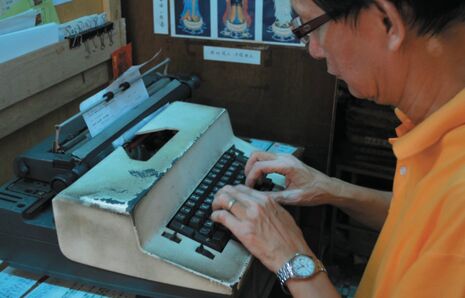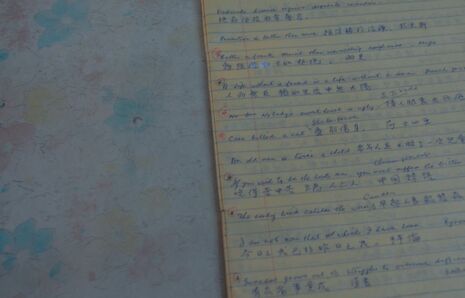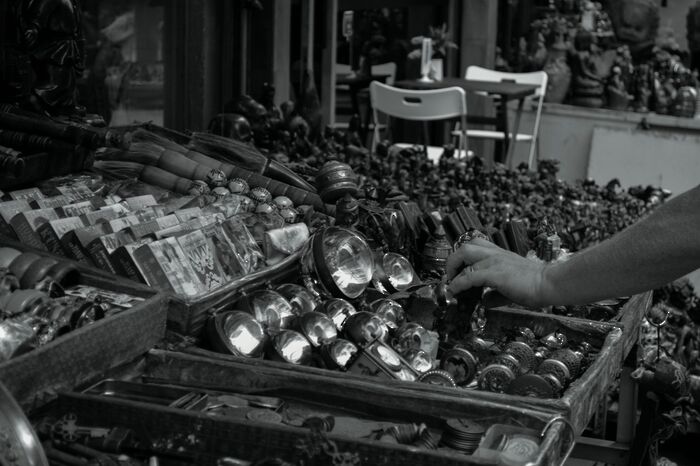The dying art of street letter writing
Sheren Mao sits down with one of Hong Kong’s last street letter writers, Mr. Xu, to discuss the disappearing art of street letter writing

Hidden in Yau Ma Tei’s Jade Market is the few remaining street letter writers of Hong Kong, whose job truly reflect the city’s earliest form of civilisation in the 1900s – Mr. Xu is one of them. Among the row of writers to the left of the market’s entrance, he is the third; on the day I met him, he was seated on his wooden stool in a bright orange polo shirt, nonchalantly munching down on an apple.
Mr. Xu’s priceless look of surprise when I asked him if I could interview him will always be engraved in my memory, as he later explained it was extremely rare for young people like me to show interest in such an unknown and old art like this. Subsequently, he excitedly pulled out his 102 year-old typewriter, which was passed down from his father, and showed me how to use it by typing English idioms that he had handwritten down in his notebooks, of which the pages were slightly tattered and very yellowed from his job all these years. While he retrieved a notebook from his wooden shelf, it was difficult not to notice the stacks and stacks of thicker directory books piled up next to it on the floor; Mr. Xu told me they contained most of his clients’ personal details that he had collected overtime.

“Before Hong Kong prospered to its modernised state today, it was a small fishing village where technology was underdeveloped and few people knew how to write. Consequently, street letter writing services began. I provide three types of services: writing letters, filling forms, and translating between English and Chinese. For example, such services can entail filling applications for new arrivals from mainland China to apply for local housing in Hong Kong and permission for single journey tickets here. I normally handwrite Chinese letters, which will normally take forty-five minutes, and type out English ones on my typewriter. A slightly different service I offer as well is decrypting letters for the elderly due to their poor eyesight and unfamiliarity with the English language.”
While words couldn’t describe how fascinating all this sounded to me, I couldn’t help but feel a little distant from Mr. Xu’s story and disconnect from the world he was portraying to me. It was difficult to imagine how just about 40 years ago, this was how my grandparents lived and what my parents’ childhood looked like, and yet children from my generation are leading such entirely different lives now. I also found myself struggling to really justify the preservation of street letter writing in light of our technological advancements today – apart from enriching our cultural heritage, what other value can street letter writing add to our society today? It was a sad thought, and finding such common ground between these extremes did not come as an easy task to me, but Mr. Xu’s grim prospect on the industry’s outlook reflected this difficulty as well.
“Business flourished during the 1950s and 1960s when hundreds of mainlanders wanted to immigrate to Hong Kong, but it is now a dying art. There is almost no competition in this industry as we are living in a technology-dominated world, so who needs anything written by hand? It was definitely difficult when business started to plummet, but we all have somewhat adjusted to this reality,” Mr. Xu said with a small smile. “Anyways, it has been and will always be a privilege to help others, and sometimes, many of my clients even come back to thank me. On a more positive note, many of us have our children to look after us so making a living is not much of an issue.”
However, Mr. Xu then lets out an uncontrollable sigh as he lamented about the mundanity of his daily routine here each day. “As you can see, there are extremely little visitors around this area and even people who usually come here to chat have been gradually decreasing over the years. I simply spend most of my day talking to the other writers and store owners around here. From time to time, we have a few foreign visitors, and it’s nice because most of them actually express much interest in my typewriter,” during which his face instantly lighted up. “Before this market gets demolished in the future, I do hope the government can be more active in promoting this area as a tourist attraction, not just for the sake of raising awareness about the dying art of street letter writing, but also for the many shop owners who still rely heavily on their jobs to make a living; this is because you have no idea how much the mere presence of visitors and tourists can encourage them to push on, and simply to find a little more purpose to keep doing what they do.”
 News / Colleges charge different rents for the same Castle Street accommodation2 March 2026
News / Colleges charge different rents for the same Castle Street accommodation2 March 2026 News / News in Brief: waterworks, wine woes, and workplace wins 1 March 2026
News / News in Brief: waterworks, wine woes, and workplace wins 1 March 2026 News / Angela Merkel among Cambridge honorary degree nominees27 February 2026
News / Angela Merkel among Cambridge honorary degree nominees27 February 2026 News / Climate activists protest for ‘ethical careers policy’1 March 2026
News / Climate activists protest for ‘ethical careers policy’1 March 2026 News / King’s hosts open iftar for Ramadan3 March 2026
News / King’s hosts open iftar for Ramadan3 March 2026









